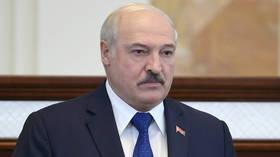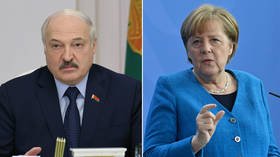Lukashenko has two demands to end EU migrant crisis, Estonia claims

Belarusian leader Alexander Lukashenko won’t help resolve the worsening migrant crisis on his country’s borders with the EU unless sanctions are lifted and he is recognized as president, Estonia’s top diplomat has claimed.
Eva-Maria Liimets, the Baltic nation’s foreign minister, made the remarks during an interview with local media on Tuesday, revealing what she said were the terms Lukashenko set out during a call with Germany’s outgoing chancellor, Angela Merkel, earlier this week.
“He wants the sanctions to be stopped, [and] to be recognized as head of state,” Liimets said when questioned about the embattled leader’s demands.
Liimets insisted against heeding to his requests, however. “In our view, it is important that the EU remains united and exerts its influence on Belarus through action,” she said, pushing for new sanctions on the Eastern European state.
On Monday, the European Council announced it was widening the embargoes placed on Minsk in light of the unfolding refugee crisis on its frontier. Brussels accuses the former Soviet republic of flying in thousands of desperate people from countries like Syria and Iraq to orchestrate a “hybrid attack” on the bloc in retaliation for sanctions.
Under the amendment, the union “will now be able to target individuals and entities organizing or contributing to activities by the Lukashenko regime that facilitate illegal crossing of the EU’s external borders.”
Belarus’ long-time leader, however, has repeatedly denied the accusations, arguing his government is no longer able to prevent the flow of migrants trying to cross over into neighboring EU states due to the effect of sanctions from Brussels.
Merkel and Lukashenko’s almost hour-long phone call on Monday to discuss the unfolding humanitarian crisis is the first known direct communication between the nation’s leader and a significant Western politician since last summer’s disputed elections.
The EU broadened its restrictive measures against Minsk after what the bloc dubbed as a “fraudulent” vote, with the opposition and many international observers insisting it was rigged. Brussels does not recognize the results of the elections, which saw Lukashenko win by a landslide, and has condemned them as neither free nor fair.
Like this story? Share it with a friend!














